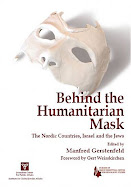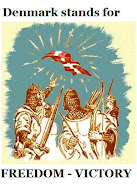The Norwegians themselves took to the rodder, and steered clear of some icebergs, for now.
from The International Free Press Society.
Hat tip: Creeping Sharia
On Friday, Dec. 19th, the Justice Ministry sent out a press release headlined: “New Penal code: Better protection against hateful expressions”.
In it Knut Storberget (Labor) explained that the government had finally decided to remove the blasphemy article. What didn’t get as much attention was that the government proposed to expand section 185 against hateful expressions:
“The government will therefore propose to expand article 185 on hateful expressions so that the provision attends to the need for criminal protections against qualified attack on religions and life outlooks.”
“So how did the Norwegian press respond to having freedom of speech curtailed because it can cause conflicts, and that Norwegian law should be changed because some immigrant groups don’t tolerate it like sturdy, Christian and ethnic Norwegians? With almost total silence,” writes journalist Jon Hustad in Dag og Tid in his article “fear of criticism of religion”, which was published Jan. 22.
One of the few things you could read about the case in the mainstream media was a report from news agency NTB that “the government wants to remove the blasphemy article.” the report was reprinted in various media, including TV2, Nettavisen and DagenMagazinet. Then it was quiet.
But it was completely different on the net. The same day that the press release was published, the Islam-critical and conservative site document.no and the net version of Fri Tanke, the Humanist Association newspaper, features big posts.
The next week, the debate raged in blogger newspapers and several bloggers wrote about the case almost daily. The most active was undoubtedly Hans Rudstad, editor of document.no.
“The proposal came like a bomb. But it would take a long time before the bomb exploded,” says Rustad to Dagbladet.no.
It took almost a month before the big newspapers and broadcast media took up the case. By then the law had already been described as an attack on democracy in Danish newspapers. NTB discovered that Per Edgar Kokkvold [General Secretary of the Norwegian Press Association] had been interviewed by Fri Tanke, and made a short summary. After that Bokkvold was interviewed on Her og NÅ on NRK:
“It’s the disturbing, offensive, shocking expressions we must protect. The Law of Cardemon doesn’t need protection,” he argued.
On January 23rd, the bloggers finally got attention from the Norwegian mass-media. Former Secretary General of the Humanist Association, Lars Gulle, and document.no journalist, Nina Hjerpset-Østli, prepared an appeal against the restriction which people could sign and send to all the parliament members and the government.
Among those who supported the appeal were Roy Jacobsen, Ingvar Ambjørnsen, Anne B. Ragde, Bernt Hagtvet, Gunnar Skirbekk, Aslak Nore, Hege Storhaug, Walid al-Kubaisi and Francis Sejersted.
The rest is history. when the government retracted the proposal, 8,267 people signed the appeal, and 4,485 had been sent. For the first time, bloggers set the political agenda in Norway
“We’ve been concerned about these issues for a long time. They laid and rose to the surface ever since the Fatwa against author Salman Rushdie. Now the attack doesn’t come from outside but from within, from our own government. It caused some reactions,” says the editor of document.no, Hans Rustad, to Dagbladet.no.
Rustad is particularly happy with the bredth of the protests.
“People who normally take different positions, stood together and protected freedom of speech. Francis Sejersted took action and Fritt Ord wrote on its site that it was setting the clock two centuries back,” says Rustad.
He thinks the protests against the blasphemy proposal might be suggestive of a division in time.
“The train came to a stop during the caricature controversy. This time something happened on its own initiative. I think it was important,” says Rustad. He think the bloggers represent the alternative public.
“Now it almost seems as if the old media doesn’t have contact with the grassroots,” says Rostad. He’s critical regarding how support for the press functions today.
“The reason for press support was diverse, but when the result is conformity and consensus, maybe we should look at other solutions. Even small funds can achieve a lot on the internet. Support for alternative voices on the net can be what it takes to speed up the old media,” says Rustad.
The editors thinks media like Dagbladet, Aftenposten and NRK had fallen out with its own readers.
“They don’t feel that the media reflects their own opinions and feelings. Serious new net sites can channel the feelings to an opinion, so it doesn’t end in frustration or worse,” says Rustad.
The Document.no editor worked for many years as a foreign journalist in NTB.
“It was there that I learned the journalist craft and gained respect for the material knowledge in the international press,” says Rustad.
When Rustad left in 2003, a new phenomenon had been born: blogs. And anybody could start their own newspaper.
“Document.no is a corrective to the established public media,” says Rustad.
Document.no often writes about violence committed by Muslims, conflicts between ethnic groups and people could get the impression that Rustad has a pessimistic view of the future. In the commentary “endelig” (finally) Rustad writes:
“People shouldn’t forget who is threatening whom. European countries have a segment of people in the population who don’t tolerate freedom of speech and wish to threaten others into silence. It strikes arbitrarily”.
He rejects those who criticize the newspaper of being Islamophobic.
“Those who accuse us of bias, maybe have a problem themselves,” says Rustad. He says that the site had to set limits so that the debate will not deteriorate.
“We are a corrective. Therefore we must be selective. The aim is information and rational debate and analysis. Norwegian media are starting to become peculiar. They’re snowed in. We must get inspiration from outside. People want something different, we notice that,” says Rustad.
In today’s blog, which he writes from the rural area of Eidsvoll, Rustad writes that the battle of the blasphemy article has been won, but not the war.
“I hadn’t walked in the door from a visit to Copenhagen, when a new bomb exploded, also this time signed by Knut Storberget,” says Rustad. This time the justice minister wants to allow the hijab in the police.
“I’m afraid this war will be long,” says Rustad.
Source (English): Islam in Europe
Original Source (Norwegian): Dagbladet
































No comments:
Post a Comment